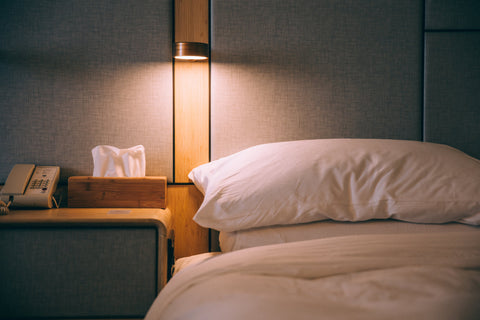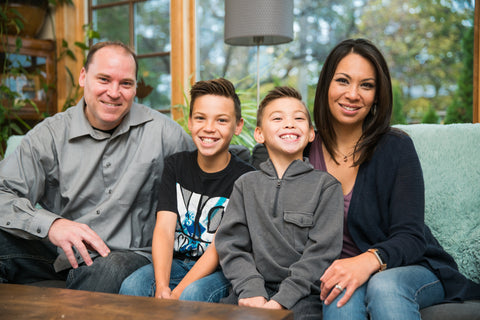After a long week, every working adult looks forward to that first day off when they might actually be able to sleep in for a change. There’s a magical feeling when you wake up that morning, knowing you got up when you wanted to and not because your alarm went off. Even if it’s just for the weekend, you’ll enjoy those pillows and blankets for as long as you can because you know the weekday will rob you of those few enjoyable moments of heaven.
Sleep is important for all of us and it may not come to a surprise to most parents that adults are sleep deprived. And for most of us, it’s not really our fault. Raising kids is not a 9 to 5 job, and not all jobs are 9 to 5. Many American parents are working too much and resting too little.
While we’re finding it hard as adults to get proper sleep, we should be educating kids and helping them to make sure they’re getting the sleep their bodies need. According to the CDC, children who don’t get enough sleep are at higher risk for conditions like obesity, diabetes, injuries, poor mental health, and problems with attention and behavior. That’s why it’s important to make sure kids aren’t staying up all night or are overstimulated before bed, even when they're on summer vacation or have the ever popular snow day.
WebMD states kids ages 7-12 need an average of 10 to 11 hours of sleep per day, while teenagers need at least 8 to 9 hours. The only way to make sure your kids are getting the right amount of sleep is to make sure they’re practicing proper sleep hygiene. Though, a bedtime might seem like the worst thing in the world to a child and some teens, it is ultimately for the best to make sure they don’t suffer from a lack of sleep later.
Techniques for Good Sleep Hygiene
-
Set a Bedtime: All kids should have a bedtime. It’s never a good idea to let your kids stay up as late as they want for a number of reasons. On a school night, a good bedtime should be around 8 or 9pm, depending on the age of your child and their sleep habits. It’s important to be firm that this is the time they are in bed and asleep. It should not be the time they start getting ready to go to bed.
-
No Napping - That’s right. Nap time is for kindergarten. You may want to take that 20 minute power nap to help you power through the day, but it’s not worth it. Naps can ruin our sleep habits and hinder bedtime sleep. So, if you’re feeling like taking a nap during the day, get up and move around. Do some exercises to get the blood flowing. Chances are if you’re sleepy during the day, you’re not sleeping enough at night. Save those few minutes of sleep for when you actually need to sleep.
-
Create a Bedtime Routine: About an hour before bedtime, kids should start doing things to help them wind down for bed. This means taking a shower or bath, brushing their teeth, getting into their pajamas, etc. Once all of these things are done, they should be in bed as close to the time they need to be asleep as possible.
-
Avoid Stimulants: Caffeine, video games, heavy foods, sugary snacks, or anything else that makes you active or stimulates the mind should be avoided at least a couple of hours before bed. Even worse are electronic devices such as smartphones or tablets. The blue light emitted by these devices has been well documented to show how much it interferes with our body’s natural ability to make us feel tired enough to sleep.
-
Keep it Cool - Research shows sleeping in a cooler room at night will help your body produce melatonin, the body’s natural sleep aid. A bedroom temperature of around 68 degrees is about optimal sleep for sleep. That’s a plus for anyone who loves to sleep cold!
-
Time to Relax - Some people prefer to go right to bed as soon as they hit the sack. Others need a little time to relax before they’re ready to doze off. For those of you who need a bit of time to fall asleep, consider reading a book before bed or even doing some yoga exercises to help your body relax enough to feel ready to sleep.
- Hello Darkness, Sleep’s Best Friend - The darker the bedroom, the better. Darkness helps our body to relax at the end of the day and tells our body it’s time for it to release melatonin and put us to sleep. It’s best to avoid any kind of ambient light in the room. Turn off televisions and cover up smaller, bright lights that might light up your room significantly at night. Also, it’s a good idea to use darker colors in a bedroom as bright colors are stimulating.
There are numerous other tips people have on how to achieve the best night’s sleep you possibly can get. Some involve making sure you have a comfortable mattress, you’re eating a balanced diet, aromatherapy, and even white noise. What other tips do you have to help your kids get all the hours of sleep they need? Leave us a comment below and join the conversation!




Comments (0)
There are no comments for this article. Be the first one to leave a message!